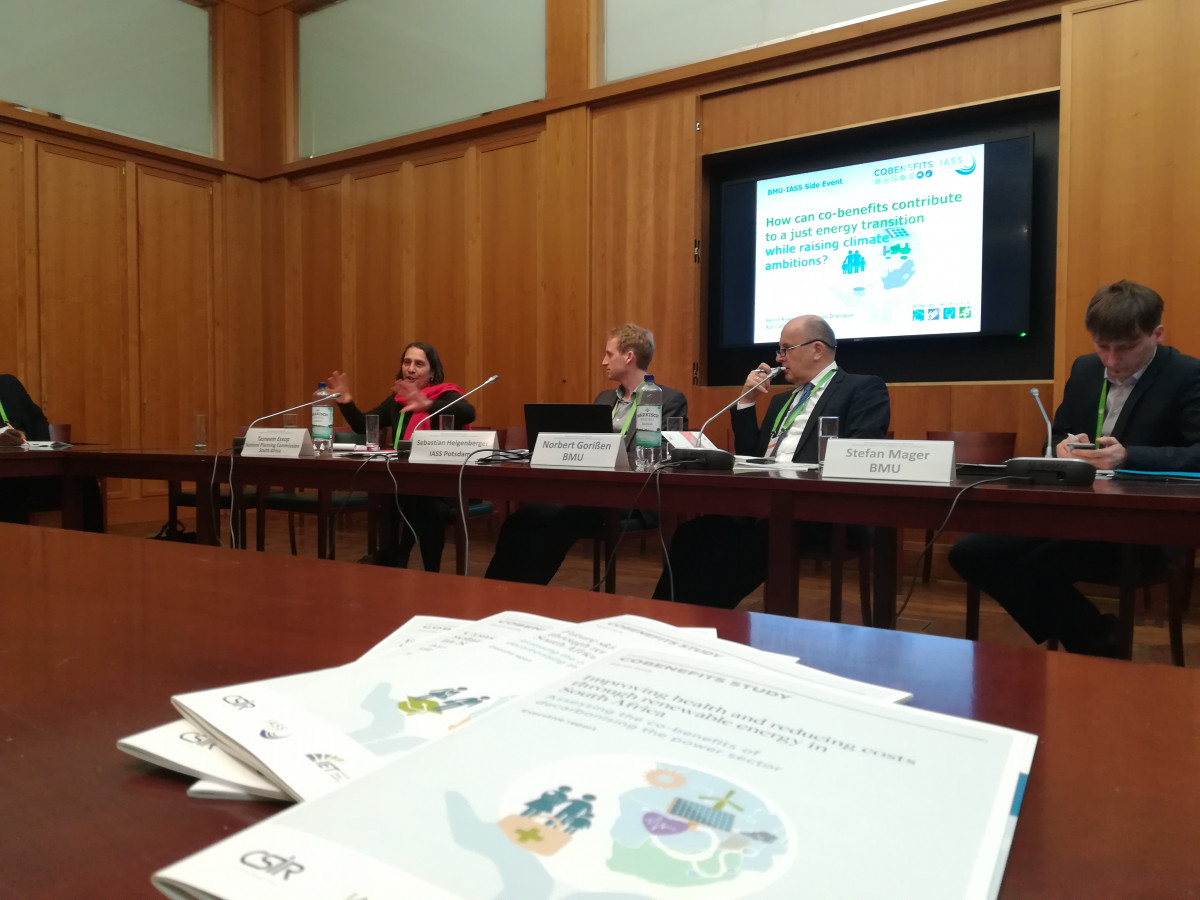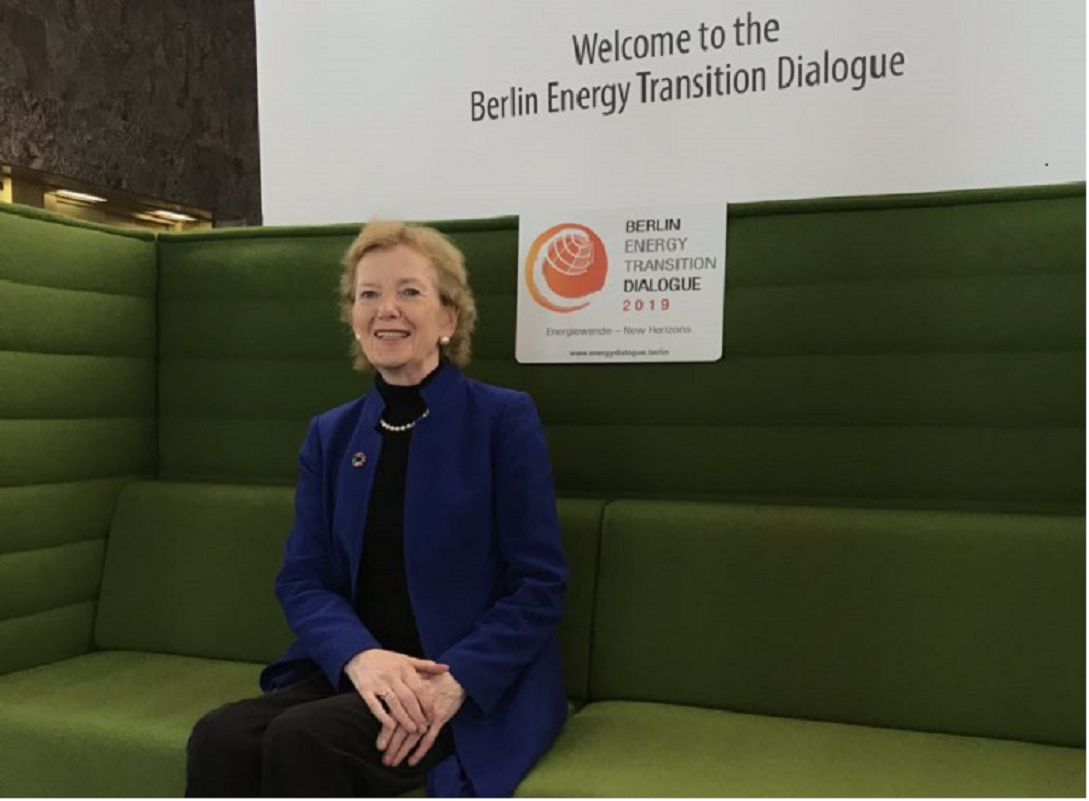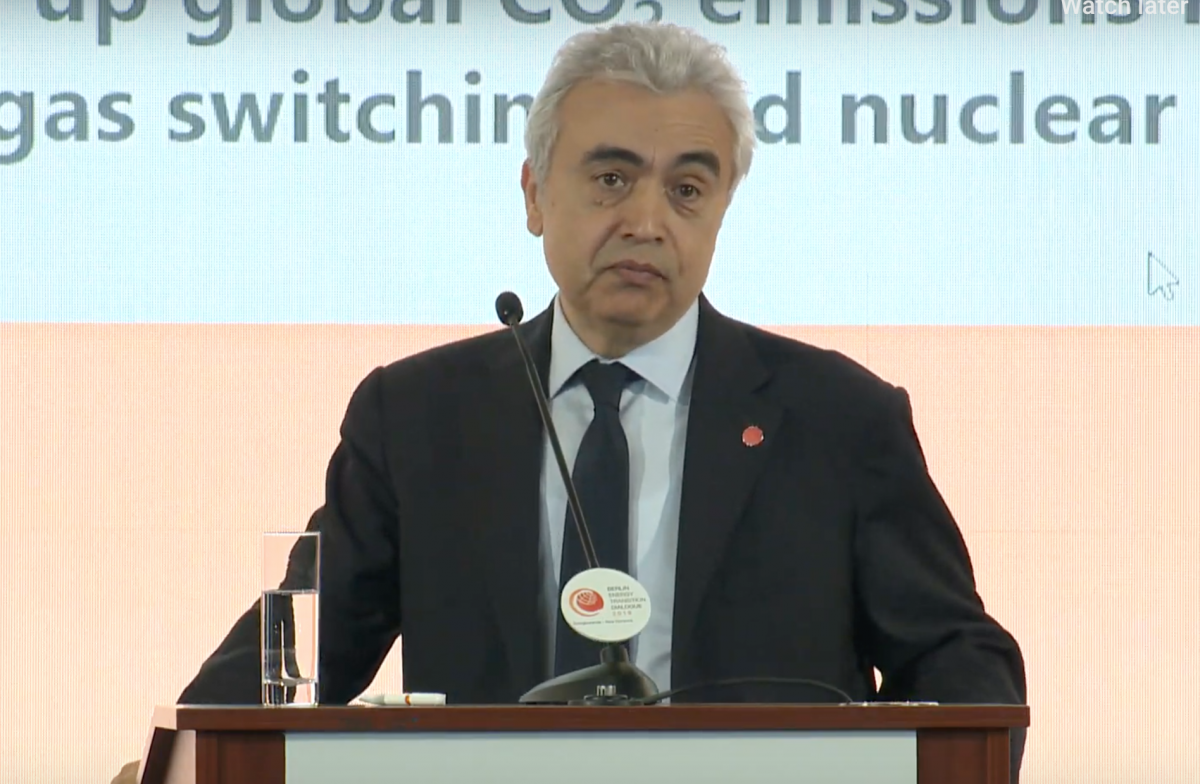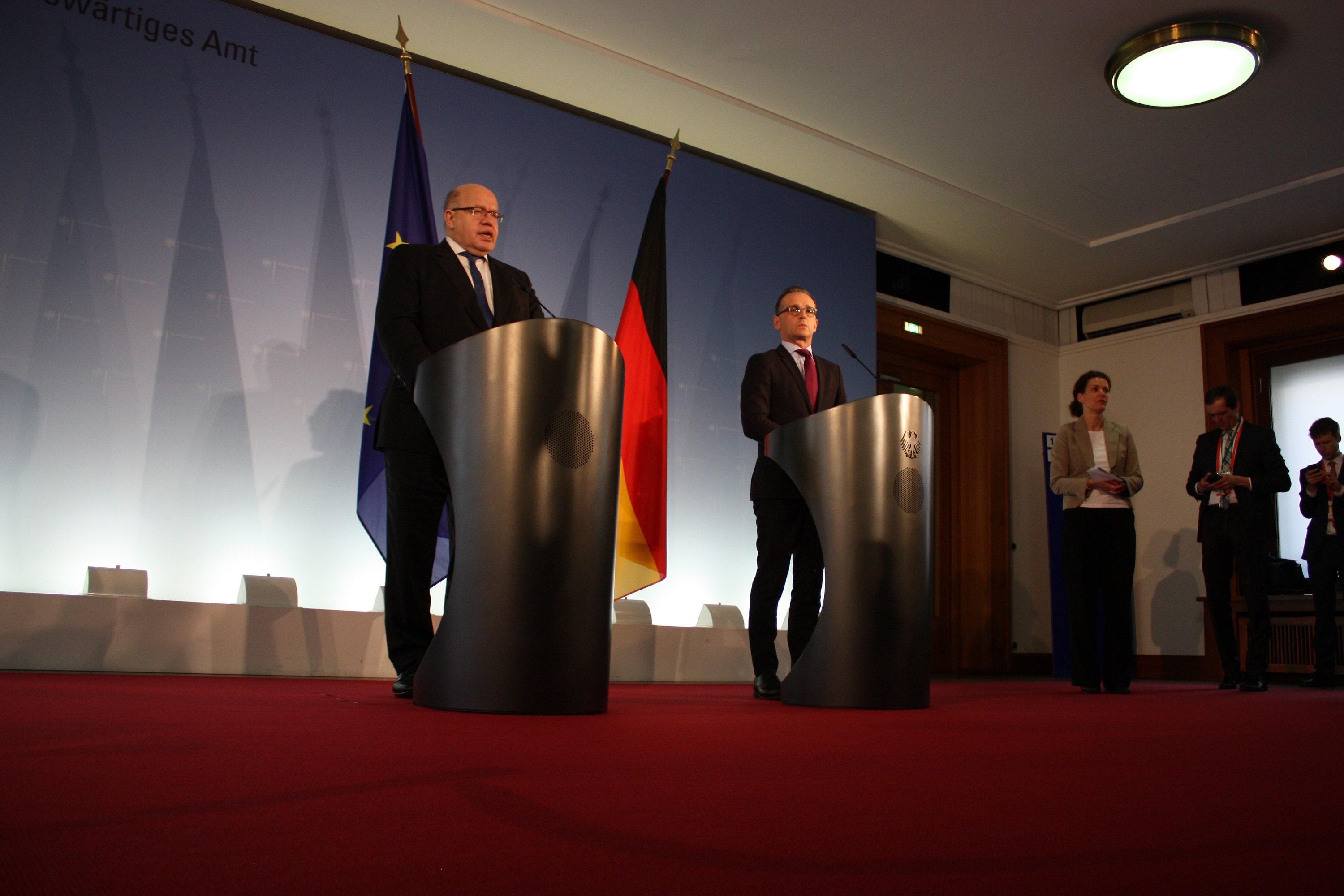Blog: Germany pushes for joint global energy transition
So you’ve put a price on carbon. Now what?
Once governments have put a price on carbon, what should they do with that revenue? That was the subject of a panel at the Berlin Energy Transition Dialogue today, which looked at some of the ways regional and national governments are handling carbon revenues.
In 2017, governments worldwide raised $33 billion [US dollars] in carbon revenue, from carbon taxes or emissions trading schemes, according to a video presented before the panel.
“The real challenge is not so much to collect these revenues, but to distribute them,” said Jonatan Julien, energy and natural resources minister in Quebec, Canada. Revenue from an emissions trading system there have gone toward a $3 billion Green Fund to support efforts to mitigate climate change, including subsidies for electric cars. In Switzerland, funds from a CO2 levy go toward refurbishing buildings; a rebate to residents for health insurance costs; and a rebate to businesses for wage costs, said Benoît Revaz, Director of the Swiss Federal Office of Energy. In California, carbon revenue is distributed by the legislature, and have gone toward rebates to reduce residential and commercial energy bills, as well as transportation infrastructure, including electric vehicle charging stations, high-speed rail, and even walking and biking infrastructure, said Robert Weisenmiller, former chair of the California Energy Commission.
Brigitte Knopf of the Mercator Research Institute on Global Commons and Climate Change (MCC) said the goal of carbon revenue should be to increase acceptance of the carbon price. “You have to spend them in such a way that this ensures a just transition,” Knopf said. “So it should increase acceptability.”
Knopf said an MCC study of different countries’ systems showed five primary ways to spend carbon revenues:
- Direct cash transfers to firms or affected households
- Decreasing personal or corporate income taxes
- Investing in low-carbon technologies or infrastructure
- Special assistance for low-income populations or regions most affected by the transition
- Assistance to companies most vulnerable to international competition, e.g. steel production
What’s most important, Knopf said, is transparency about how the money is being spent. Countries around the world have found that acceptance increases with transparency, she said.
EIB: We want to be Europe’s climate bank
When it comes to financing climate action, we have to get creative, European Investment Bank vice president Andrew McDowell told the audience at the Berlin Energy Transition Dialogue (BETD) this morning.
There’s often a disconnect between climate projects and investment, McDowell and other panellists said. Sometimes the money is there but the projects aren’t. Sometimes the projects are there, but the financing model isn’t.
The EIB wants to find ways to bridge that gap, McDowell said, developing financing models that can then be adopted more widely.
“We really do regard ourselves as the EU’s climate bank,” McDowell said, adding that the EIB pioneered green bonds (bonds linked to climate actions) and set the standard for how to structure and finance offshore wind projects - standards the private sector has since adopted.
The bank wants to continue developing new financial instruments that the private sector can then use. One example, he said, is green mortgages — or lending aimed at improving the energy efficiency of homes. The EIB is working with private banks to set standards and develop green mortgages as an asset class, McDowell said. The goal is then to “crowd-in” the private sector, to mobilise private financing for energy efficiency.
“Energy efficiency, I think, is going to be the one nut we really have to crack if we’re going to meet the targets that have been set,” McDowell said.
These funding models are a necessary complement to policies like carbon-pricing, McDowell told the audience at BETD.
“I’m a fundamental believer in the value of carbon pricing,” he said, adding that the European Union Emissions Trading System [ETS] has shown that when the price goes up, emissions go down. But it’s not enough to simply set a price on carbon to drive investment away from emissions-heavy projects, he said. There must also be climate-friendly projects ready to receive that investment - and that’s where the work is now.
The bank is currently reviewing its energy lending policies in light of the European Commission’s target of being climate-neutral by 2050, McDowell said. He noted that French president Emmanuel Macron has backed the idea of an EU bank to drive climate investment.
“We want to be the institution that delivers on that vision,” McDowell said.

Renewables can bring jobs, savings, health benefits – and climate action
The use and expansion of renewable energy is a good idea for many reasons beyond greenhouse gas reduction, and the socio-economic benefits can help convince policy makers in countries around the world to step up climate action. That’s the main take-away of a side event on the co-benefits of climate action organised by the federal environment ministry and the Institute for Advanced Sustainability Studies (IASS) on the second day of the Berlin Energy Transition Dialogue (BETD).
In their joint project, COBENEFITS, the two institutions are collaborating with national partners in India, South Africa, Vietnam and Turkey to explore country specific co-benefits of climate policies, with an emphasis on the opportunities presented by renewable power generation.
“With our country-specific assessments, we want to highlight the opportunities for the people in each state,” said Sebastian Helgenberger of the IASS.
The project has recently published four new studies on South Africa, on topics such as improving health and reducing health system costs through renewables, or consumer savings through solar PV self-consumption. One study shows that it is technically and economically feasible to install more than 11 GW of rooftop solar PV in metropolitan municipalities by 2030, which would bring household and business savings of up to 90 billion dollars.
South Africa must also find ways to deal with the decline of coal mining and coal-fired power generation, which could leave hundreds of thousands of workers in the sector unemployed.
“Of course, the renewables sector cannot solely be responsible for absorbing former coal jobs,” said Tasneem Essop of the National Planning Commission South Africa, which is responsible for strategic planning for the country. “We have to look at an economy-wide absorption.” She welcomed the “evidence-based” input of the new studies which could help plan for a just transition in the country.
Tobias Zeller of the South African-German Energy Partnership said studies like those by the COBENEFITS project could be a door-opener for the debate on climate action with groups in South Africa that have been sceptical so far of the costs of the energy transition.
The single most effective tool: A carbon price?
Luxembourg’s energy minister Claude Turmes told an audience at the Berlin Energy Transition Dialogue that the most effective tool now for reducing EU carbon emissions would be a carbon price floor, at least for Western Europe, similar to the one that currently exists in the UK.
Carbon prices are a massive market intervention, Turmes said during a panel discussion focussed on the socio-economic impacts of coal exits. But if the European experience with, for instance, the European Union Emissions Trading System (EU ETS), has showed anything, it is that this kind of intervention is necessary.
“What is important is the market-only [effort] failed in Europe,” Turmes said.
This has to be paired with support for coal-dependent communities, Turmes said. But ultimately, the EU — and the world — needs a higher price to drive countries to move faster.
“We need a sense of urgency, not only to move quicker into renewables, we need a sense of urgency to close down coal power plants that are hardly five or eight or ten years old,” Turmes said — and not just in Europe. “If we want coal power plants in [places like] Indonesia to close down, and I think we have to, or we are just cheating ourselves, somebody must put money on the table.”
Turmes’ point echoed recent discussions in Germany. Despite resistance from several conservative government politicians, the debate about a carbon price has picked up over recent weeks in Germany - in part due to pressure from the Fridays For Future student climate protests, according to climate scientist Ottmar Edenhofer. The student activists were making many politicians "very, very nervous", Edenhofer told an audience of international journalists at the Clean Energy Wire's Global Energy Transition Journalism Conference 2019 in Berlin. German media has recently reported that the federal government plans to ask Germany’s Council of Economic Experts to examine the risks and opportunities posed by a CO2 tax.
Renewables can cover almost 90 percent of global power demand by 2050 – study
Electricity produced from renewables will be able to provide the bulk of global power demand by 2050, according to the International Renewable Energy Agency’s (IRENA) Global Energy Transformation: A Roadmap to 2050, launched today at the Berlin Energy Transition Dialogue (BETD). “Renewable energy is the most effective and readily-available solution for reversing the trend of rising CO2 emissions,” said IRENA Director-General Francesco La Camera. “A combination of renewable energy with a deeper electrification can achieve 75 percent of the energy-related emissions reduction needed.”
For #betd2019 intergovernmental renewable energy champion @IRENA has published a path to... 86% RE by 2050. Why not 100%?
— Megan Darby (@climatemegan) April 9, 2019
The German government's current official goal is to reduce gross power consumption by 10 percent by 2020 (compared to 2008), though the country is set to miss the target. But that goal might not make sense anymore, said panelists at the BETD discussion “Beyond electricity - making the transition work in all sectors.” If renewable electricity is increasingly used to power sectors such as transport and heating, then reducing overall power use might not be the right metric.
“Electrification of all sectors is crucial” for climate protection, said Hans-Josef Fell, co-author of Germany’s Renewable Energy Act (EEG) and president of Energy Watch Group (EWG). Fell gave a preview of an upcoming study, which shows that transitioning to 100 percent renewable energy is technically feasible and economically advantageous. EWG will publish the study this Friday, 12 April.

We need a climate justice movement – former Irish President Mary Robinson
The world needs a climate justice movement that can speak for those who are least able to defend themselves, said former Irish President Mary Robinson at the 5th Berlin Energy Transition Dialogue. This includes those suffering from extreme weather events in developing countries, Robinson said, but also those in industrialised countries at risk of losing their jobs due to the energy transition.
In Germany, ending coal-fired power generation means whole regions could lose their economic foundation, so the government must aim to ensure a just transition, said Robinson. That could serve as a model, Robinson said: “A success in Germany can show other countries that a just transition can be economically, socially and politically viable,” she said. But Robinson came out against paying fossil energy companies for closing their power stations under a phase-out plan. “Financial support for the people in the coal regions is fair, but it would be questionable if Germany spent billions for compensation payments,” she said. Robinson also welcomed the “Fridays For Future” protests, which have brought students into the streets around the world to demand more climate action. “Thanks to the recent school student climate protests, we have begun to understand the intergenerational injustice,” Robinson said.

IEA Chief: Existing infrastructure alone will use 90 percent of world’s carbon budget
International Energy Agency (IEA) chief Fatih Birol delivered a barn burner of a speech here this morning, calling on countries to get serious about reducing their carbon emissions - and urging leaders to be honest about the scale of the effort required to meet the goals of the Paris Climate Agreement.
“Please, please, please let’s put things in context to understand the real dimensions of the challenge we have in front of us,” Birol said, noting that the world is currently on track for a temperature increase of 3 degrees Celsius. (The Paris Agreement called for keeping warming well below 2 degrees Celsius above pre-industrial levels.)
Everyone says they want to see emissions decline, Birol said, “But I look at the numbers.” According to the IEA, energy-related CO2 emissions hit an historic high in 2018.
“There is a global disconnect between political statements, targets and what is happening in real life,” he said.
Birol noted that the biggest driver of energy-related emissions in 2018 was coal-fired power generation. He complimented Germany’s efforts to exit coal power. But, he noted, Germany represents a tiny fraction of coal generation worldwide, and much of that generation exists in countries where large swaths of the population are struggling to escape poverty.
“Who will dare to go to Indonesia, to Thailand, to India, to the Phillipines, to tell utilities to shut it down, which is providing electricity to villages?” Birol asked. “It’s not fair.”
The world has two “bedrock” tools to fight climate change, Birol said: renewable energy and energy efficiency. There is some good news: renewables continue to get cheaper, and the share of renewable power is increasing. But two-thirds of electricity generation still comes from fossil fuels, he said, including coal and natural gas.
Meanwhile, energy efficiency is not getting the attention it deserves, he said, and in 2018 global energy efficiency actually declined. “One number which is very, very worrying, at least for me,” Birol said. “Today, two out of three buildings in the world have no building codes or efficiency standards.” These buildings will be with us for decades, he said, wasting energy.
An analysis from the IEA found that over the next 25 years, existing infrastructure alone will consume more than 90 percent of the carbon budget allowed under the Paris Climate Agreement, Birol said.
That means the world faces two tasks, he concluded: to build new infrastructure that is as sustainable as possible, and to rebuild existing, unsustainable infrastructure.
Birol ended with an appeal - “It is not from the IEA. It is from me,” he said. Everyone has their favourite technology, their preferred method for reducing CO2 emissions. Set that aside, he said. The challenge of climate change is huge: “Therefore I believe it is not time to boost our egos but to reduce CO2 emissions.”
Countries across the globe should get behind the idea of a world-wide energy transition to safeguard peace and economic wealth for their citizens, Germany's energy and foreign ministers said. “A successful energy transition needs to be conceived globally,” said economy and energy minister Peter Altmaier at the opening of the Berlin Energy Transition Dialogue (BETD) in Berlin. “Let us jointly commit to multilateral cooperation and solidarity, and exchange experiences.” Young people around the world dreamed of a future where they lived on a healthy planet and in wealth. “We must not destroy the dream of our citizens.
Decision-makers from across the globe, including ministers and high-level delegations from more than 50 countries, are gathering in Berlin for the government’s fifth energy transition dialogue. They are set to discuss the opportunities and challenges resulting from the global shift to green energy, such as its “major geopolitical consequences”, as German foreign minister Heiko Maas put it in his opening remarks.
Conflicts based on energy will become less, as renewables are available all over the world, he said. “However, there will not only be winners,” as the fossil-based business models of whole countries will collapse. “The best prevention is to extensively invest into competitive renewables already today,” said Maas. Germany would use what many see as its pioneer role to “speed up international progress”.

